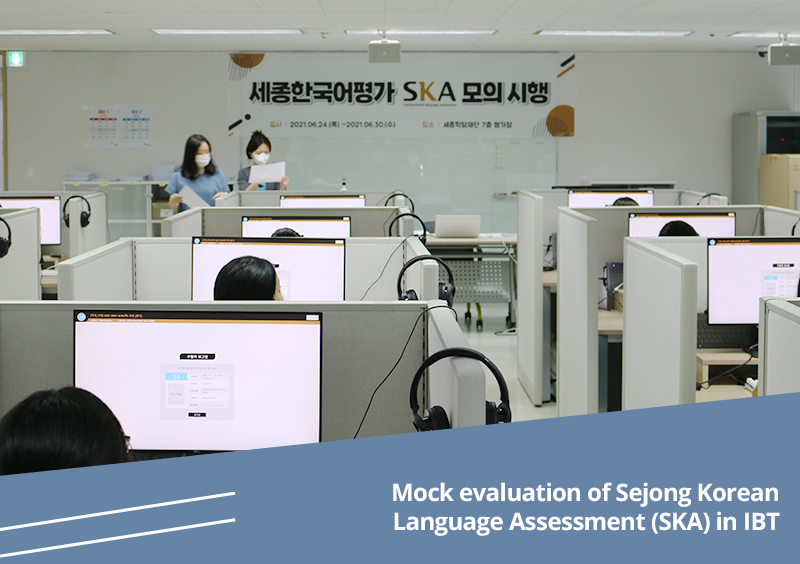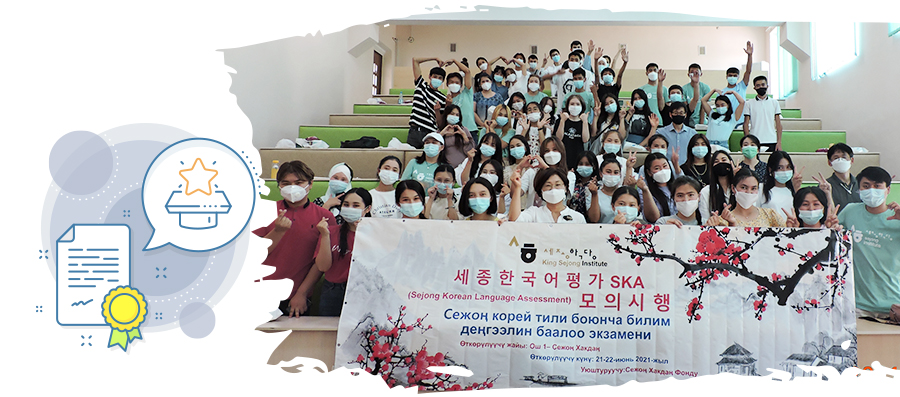Writer홍보협력팀
Tag
2021-07-15
View4969



The King Sejong Institute Foundation (KSIF, president: Kang Hyounhwa) has conducted a large-scale mock test of ‘SKA (Sejong Korean language Assessment)’ for two weeks from June 15 to June 30, targeting Korean-language learners in Korea and overseas.
As the Korean wave is rising through BTS, Parasite, etc., the number of foreigners who want to learn Korean is also dramatically increasing. Accordingly, the number of the King Sejong Institutes in the world has increased from 172 in 57 countries in 2018 to 234 in 82 countries in 2021. As the demand increased, the purposes of study have become diverse and the need for practical evaluation of Korean language also grew. It is becoming more and more necessary to develop and distribute an effective evaluation tool that integrates different learning objectives and the lessons of King Sejong Institutes operated in flexible ways. Therefore, KSIF has developed the Sejong Korean Language Assessment (SKA).
Sejong Korean Language Assessment (SKA) is a practical Korean proficiency test focusing on the communicative skills of overseas Koreans and foreigners who do not speak Korean as their native language. To create an objective standard for Korean education that can be applied to different educational environments in the world, it was developed based on the “Standard Curriculum for Korean Language” announced by the Ministry of Culture, Sports and Tourism. This is intended for the beginner and intermediate level examinees and evaluates all areas of communication including speaking, listening, reading, and writing.
Unlike the evaluations for international students in intermediate to advanced level, Sejong Korean Language Assessment (SKA) evaluates beginner and intermediate level communication used in daily lives. Equivalent to TOEIC, it pursues Korean for practical purposes such as use in daily lives, travel, employment in Korean companies overseas, and business.
A spokesperson for the King Sejong Institute explained, “The biggest reason for studying Korean is interest in the Korean wave and Korean culture, but it is changing recently,” and “more people are learning Korean in the King Sejong Institute to get a job at a Korean company in their countries or to live in Korea.” In fact, many Korean companies are entering the overseas market and expanding local employment every year. Sejong Korean Language Assessment (SKA) will be used as an official testing means for this demand.
Starting with the basic research in 2019, Sejong Korean Language Assessment (SKA) has established its foundation for assessment by developing evaluation questions, scoring criteria, and basic model for IBT evaluation system in 2020. It will be refined and used for conducting the large-scale mock evaluation on 9,000 Korean learners at home and abroad this year. Mock evaluations will be performed once in the first half and once in the latter half of the year. The number of examinees taking the first evaluation test amounts to 2,500. The test in the second half will be given in October, with an expanded range of test-takers. When the budget is secured as planned, regular evaluation will start from 2022 in the King Sejong Institutes all over the world.
The first mock evaluation will be given to the Korean learners in universities and language schools in Korea, as well as in King Sejong Institutes overseas. Outside Korea, 1,700 people have completed the test in a total of seven King Sejong Institutes in five countries (Ulaanbaatar 1, Algiers, Tashkent, Yanbian 2; Qingdao 2; Hangzhou, Osh 1・2) from June 15 to 22. In Korea, 800 people from about 10 institutes took the test from June 24 to July 1.
Test-takers can choose from speaking, listening, reading, and writing, according to their needs. Furthermore, it has increased its practicality by giving the choice of Internet-based test and paper-based test.
A countermeasure for the continuous expansion of COVID-19 was also prepared. The venue was disinfected before the test and arranged so that there was sufficient space between the test-takers; temperatures were taken, and masks were mandatory for each individual; and hand sanitizers were available.
A staff member of King Sejong Institute who operated the mock evaluation commented that “As the Sejong Korean Language Assessment (SKA) was provided in a timely manner, the students at KSI are motivated to study. It is expected that “the stature of KSI will also improve when the regular evaluation starts.”
President Kang Hyounhwa of the King Sejong Institute Foundation explained, “Sejong Korean Language Assessment (SKA) is an important test in that it completes an educational curriculum by identifying the level of education through evaluation, the last step of education, and reflecting the result in the Korean education policies overseas. The test will be available overseas stage by stage, based on the experience of this test operation.”
